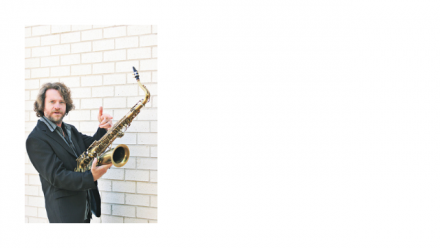Research Seminar: John Mackey

Theorizing Improvisation – Reducing Unpredictability or Uncertainty in relation to ‘Outside Playing’
My PhD research focusses on the development of improvisatory vocabulary utilizing the pentatonic scale in a chromatic and anagrammatic system of permutated structures. The effect of this system creates line construction containing varying degrees of dissonance and consonance.
The traditional rules of functional harmony and chord to scale relationships do not apply within this system.
Within the music paradigm, improvisation utilizes preconceived elements of certainty or predictability in the form of applying scales to chords and rhythm. During the act of improvising however, each practitioner creates an environment of opposing elements of predictability and unpredictability, based on ones approaches to reimagining and shaping these preordained facets.
Unpredictability in relation to the Chaos Theory suggests that, ‘in mechanics and mathematics, the study of apparently random or unpredictable behaviour in systems governed by deterministic laws. A more accurate term, deterministic chaos, suggests a paradox because it connects two notions that are familiar and commonly regarded as incompatible’. (https://www.britannica.com/science/chaos-theory)
Within the musical improvisation realm, unpredictability, in relation to the Chaos Theory, balances the perceived randomness of music making with the reality of honed skills which can include elements such as, aural aptitude, technical prowess, demonstrated theoretical knowledge, rhythmic security and musical creativity.
Converting pre-set structures and theories into an improvised solo creates varying degrees of uncertainty.
“Even though each new improvisation is different from past improvisations, most improvisers feel that there is a tendency to repeat oneself in terms of note choice and rhythmic application; the inevitable emergence of personal clichés results in a desirable imperative for uncertainty: in order for an improviser to continue to be creative, ‘safe’ clichés must give way to the ‘fresh’ and unpredictable ‘freedoms’ possible through uncertainty’. (Mackey, Pg 105 2008)
My presentation will cover the unusual partnership of alternative scale choices constructed off chord tones beginning from the 7th degree, and played over a basic chord colour. To set the scene I will be demonstrating how one superimposes a B Aeolian scale over a C Major 7 chord, and then explain the close relationship this unrelated mode has to the parent key of C Major. The material presented this week appears in my Practise chapter as part of my ongoing PhD thesis.
On-Line References:
(https://www.britannica.com/science/chaos-theory)
References:
Mackey, J (2008) ‘Uncertainty and Risk, Multidisciplinary Perspectives’, published by Earthscan in UK and USA.
Bio
John is a renowned saxophonist, composer and educator. He has been lecturing at the ANU School of Music since January 2000. John was nominated for the Freedman Jazz Prize in 2001 and has recently been invited into the Higher Education Academy in the UK as a Senior Fellow and is excited about a recent co-invention with the Physics and Engineering Department at ANU. He is currently halfway through his PhD based at ECU, Perth,WA.
His topic is researching Extended Applications of the Pentatonic Scale and proposing a new modal concept.
John has performed with many artists inlcuding:
Ray Charles, B.B. King, Dame Kiri Tekanawa, Kurt Elling, Kendrick Scott, Nat Adderley, Eddie Henderson, Roy Hargrove, Red Rodney, Lew Tabackin, Toshiko Akiyoshi, Kenny Werner, Bob Mintzer, Richie Cole, Johnny Griffin, Al Cohn, Woody Herman, Ralph Moore, Mark Levine, Don Rader, Ronnie Scott, Jim McNeely, Kenny Werner, Mike Nock.
This is a virtual event that will be held via Zoom
Meeting link: click here
Meeting ID: 959 7575 6108
Password: 504772










